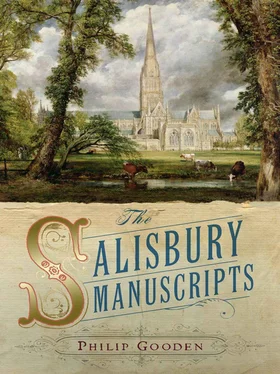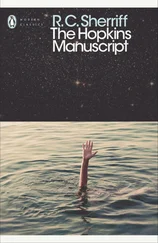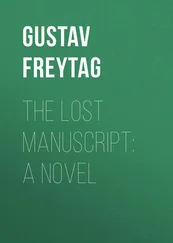Philip Gooden - The Salisbury Manuscript
Здесь есть возможность читать онлайн «Philip Gooden - The Salisbury Manuscript» весь текст электронной книги совершенно бесплатно (целиком полную версию без сокращений). В некоторых случаях можно слушать аудио, скачать через торрент в формате fb2 и присутствует краткое содержание. Год выпуска: 2009, Издательство: Soho Press, Жанр: Исторический детектив, на английском языке. Описание произведения, (предисловие) а так же отзывы посетителей доступны на портале библиотеки ЛибКат.
- Название:The Salisbury Manuscript
- Автор:
- Издательство:Soho Press
- Жанр:
- Год:2009
- ISBN:нет данных
- Рейтинг книги:3 / 5. Голосов: 1
-
Избранное:Добавить в избранное
- Отзывы:
-
Ваша оценка:
- 60
- 1
- 2
- 3
- 4
- 5
The Salisbury Manuscript: краткое содержание, описание и аннотация
Предлагаем к чтению аннотацию, описание, краткое содержание или предисловие (зависит от того, что написал сам автор книги «The Salisbury Manuscript»). Если вы не нашли необходимую информацию о книге — напишите в комментариях, мы постараемся отыскать её.
The Salisbury Manuscript — читать онлайн бесплатно полную книгу (весь текст) целиком
Ниже представлен текст книги, разбитый по страницам. Система сохранения места последней прочитанной страницы, позволяет с удобством читать онлайн бесплатно книгу «The Salisbury Manuscript», без необходимости каждый раз заново искать на чём Вы остановились. Поставьте закладку, и сможете в любой момент перейти на страницу, на которой закончили чтение.
Интервал:
Закладка:
He felt his way forward in the rain until he was at a crouch and grasping a stone upright set to one side of the entrance. The stone, about four feet high, had been cut for a purpose. The work was primitive but there could be no doubt it was done by the hand of man. Resting on top of the upright was another slab of stone like the lintel to a door. The corresponding upright on the other side had fallen inwards so that the lintel was at a diagonal across the entrance. The resulting triangular aperture was small but sufficient to allow someone to worm his way inside. After his most recent expedition the man had made a rudimentary attempt to hide the spot by dragging across a severed tree branch so that it partially blocked the opening. Now he tugged at it with both hands and hefted it down the slope.
The man eased off his bag and placed it by the aperture. He glanced uphill for a last time. Seen from this crouching position, the sheer bulk of Todd’s Mound seemed about to tumble down and bury him and he felt, as well as excitement, a tremor of fear. He shrugged the feeling off and pushed the bag ahead of him into the narrow entrance.
He had to crawl to make his way to the interior but, once there, the space grew bigger and he was able to kneel. His head was brushing against the low roof. There was the smell of damp and leaf-mould, and something more rank underlying it. It was pitch dark. The man unfastened his bag and brought out an oil lamp which he placed carefully between his spread knees. He took a box of matches from his coat pocket and, working by touch, struck a light. The acridity from the match filled the tiny space.
When the lamp was going the man spent some time adjusting the wick until he was satisfied with the quantity of light. The light was a warm gold. Like the smell of the match, it was oddly comforting. He squatted on his haunches and raised the oil lamp to examine the interior of the cave as if for the first time. Really, he was making sure that no one had penetrated this secret space since his last visit. The fact that the tree branch outside the entrance hadn’t been disturbed was not conclusive enough for him. He was a careful man who took precautions. And what he saw now did not reassure him.
The light from the lamp showed that this space, burrowed into the side of Todd’s Mound, extended for about two dozen feet at right angles from the little entrance. There were pale objects piled at the end, far enough away for the lamplight not to reach fully. The tunnel-like space was wider than it was high and the roof of rock and chalky soil sloped down towards the end. If this place had once been a natural cave or fissure in the hillside, it had been enlarged and reinforced at the sides with thin slabs of stone. These stones, like the ones around the entrance, bore man-made marks.
On his second visit the man had taken some of the bones which were among the items he had discovered at the other end of the burrow. When he first picked up the bones he experienced a momentary unease. Yet he told himself, he won’t mind, he’s out of it now. Or was it a she , not a he? But he thought not. The bones seemed too large to be a woman’s, and he was a good judge of such things. So he had placed them in a deliberate pattern a couple of yards inside the opening. The bones — shinbones and a forearm from a human skeleton — were greasy and unpleasant to the touch. Even so, handling them did not trouble him. He wanted another small guarantee that no one would disturb the burrow, ‘his’ burrow as he considered it.
Accordingly the man spent some time thinking of a pattern to put the bones into, a pattern that would look arbitrary but have meaning for him. He remembered the private smile he’d given as he positioned the bones in the form of an H, the initial of one of his names. It looked like an accidental arrangement yet anyone stumbling across the hidden place and worming his way into the interior could hardly avoid disturbing these carefully placed remains.
By the light of the lamp the man saw, with a thrill of fear, that that was what had happened. The shinbones which formed the uprights of the H, together with the ulna that made the cross-piece, had not merely been disturbed. They had been scattered. They were lying to one side of the burrow as though they’d been impatiently tossed there. By a human intruder? By someone trespassing on his burrow? The man suppressed an instinctive urge to douse his lamp as if he was being watched at that very instant, and examined the area around where he’d placed the bones.
But the ground was a mess of mud and chalk and fragments of root. There were no discernible human marks. He simply couldn’t tell whether anyone else had blundered into this place. The man realized that his little precautions didn’t amount to much. He recalled the shepherd striding down the hill on the far side of Todd’s Mound. Was it possible that the shepherd or some other country fellow had gone poking into his burrow and pushed aside the bones which had been positioned in the shape of a letter? Had this other person found. . what there was to be found at the far end?
There was only one way to make sure of course. To go and see. Yet the man did not move. He stayed on his haunches, surveying the space by the light of the lamp. His breath came short and fast. He heard the beating of his heart mingled with the hiss of the oil lamp. The burrow seemed to close in round him. He made a conscious effort to calm himself. When his heart slowed and his breath eased, he listened hard. The wind moaned outside and he was startled by a movement in the corner of his eye. Something small, something grey and scuttling, which disappeared into a fissure in the flank of the burrow. That was the explanation for the moving bones, no doubt. A mouse, a rat, some earth creature, had disturbed the bones. Yet the man was not altogether convinced by his own explanation.
Anyway there was nothing to be done except to get on with the job. He’d be making his way back in the darkness. Too late, he cursed his caution in not working by daylight. Carrying his burden away by night, he risked a broken leg or worse. Even so, he couldn’t avoid the thought that there was a certain appropriateness to doing all this under the cover of night. A moonless night too. He brought a flask from his coat pocket and unscrewed the cap. He took a good swig of brandy. Its warmth reached down inside him. He stroked the flask as if in gratitude, mechanically running his fingertips over the initials incised into the surface.
Fortified, he took up his bag and the oil lamp and, with back bent, shuffled awkwardly on his knees towards the further end of the burrow. There was a collection of bones up here, including a skull and the arch of a ribcage. The skull was resting against a rock. The man himself had put it in that position. Fortunately, it remained as he had left it, lolling like a head against a pillow. The skull grinned at him, as if it knew some secret. There was a hole in one side of the head although the man couldn’t tell whether it was as a result of a wound inflicted before death — if so, certainly a fatal one — or whether it had been produced by the manner of his burial or even later. It was likely that this individual had died by violence or perhaps been sacrificed in some ancient, barbaric rite.
He put the lamp on the ground and lifted the skull up from its place near the ribcage. The space was cramped and airless. It would have been easier to work here if he cleared the bones but he was curiously reluctant to disturb them further. Behind the spot where the skull had been the rock was relatively smooth. Using a trowel from his bag, the man scraped away the mud which he himself had plastered there on his last visit. His arms and legs bumped against the remains of his underground companion but he was so absorbed in his work that he hardly noticed them or the small sounds behind his back — that grey scuttling creature, no doubt.
Читать дальшеИнтервал:
Закладка:
Похожие книги на «The Salisbury Manuscript»
Представляем Вашему вниманию похожие книги на «The Salisbury Manuscript» списком для выбора. Мы отобрали схожую по названию и смыслу литературу в надежде предоставить читателям больше вариантов отыскать новые, интересные, ещё непрочитанные произведения.
Обсуждение, отзывы о книге «The Salisbury Manuscript» и просто собственные мнения читателей. Оставьте ваши комментарии, напишите, что Вы думаете о произведении, его смысле или главных героях. Укажите что конкретно понравилось, а что нет, и почему Вы так считаете.












